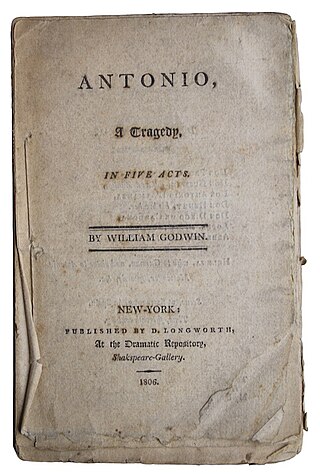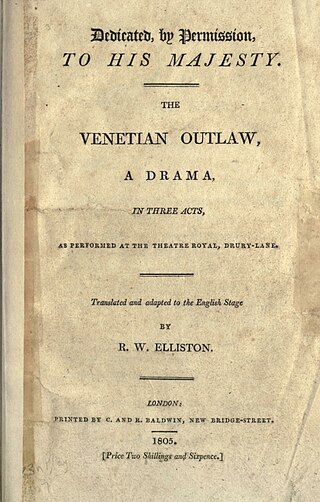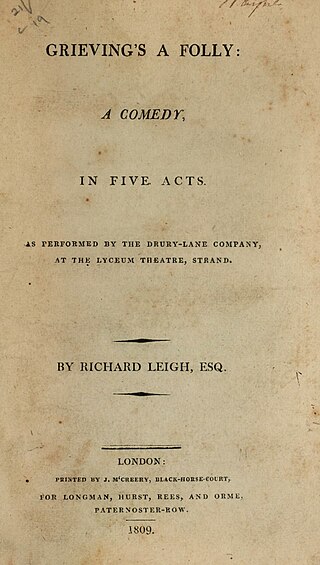First Love is a 1795 sentimental comedy play by the British playwright Richard Cumberland. It was first performed at the Drury Lane Theatre in May 1795. Frederick Mowbray becomes the protector of Sabrina Rosny after her abandonment by Lord Sensitive.

Maria Rebecca Davison (1780?–1858) was a British stage actress. She was billed as Miss Duncan in the early years of her career before her marriage. She appeared as a leading performer at the London patent theatres Covent Garden, the Haymarket Theatre and particularly at Drury Lane.
The Drummer is a 1716 comedy play by the British writer Joseph Addison, also known as The Drummer, or, The Haunted House.

The Volunteers is a 1692 comedy play by the English writer Thomas Shadwell. Shadwell completed the play shortly before his death and it was performed posthumously at the Drury Lane Theatre by the United Company. It is also known by the long title The Volunteers; or, The Stock-Jobbers.
Seduction is a 1787 comedy play by the British writer Thomas Holcroft.
Sir Anthony Love; Or, The Rambling Lady is a 1690 comedy play by the Irish writer Thomas Southerne. It was originally staged by the United Company at the Theatre Royal, Drury Lane with a cast that included Susanna Mountfort in a breeches role as Sir Anthony Love, William Mountfort as Valentine, Joseph Williams as Ilford, William Bowen as Sir Gentle Golding, Anthony Leigh as An Abbe, John Hodgson as Count Canaile, Samuel Sandford as Count Verole, George Bright as Waitwell, Colley Cibber as Servant to Sir Gentle, Charlotte Butler as Floriante, Anne Bracegirdle as Charlote and Frances Maria Knight as Volante. The play's incidental music was composed by Henry Purcell.
The Massacre of Paris is a 1689 tragedy by the English writer Nathaniel Lee. It was first staged by the United Company at the Theatre Royal, Drury Lane. It is based around the 1572 St. Bartholomew's Day massacre which led the killing of many Huguenots during the French Wars of Religion. The events had previously been portrayed in Christopher Marlowe's Elizabethan play The Massacre at Paris.

The Fortune Hunters; Or, Two Fools Well Met is 1689 comedy play by James Carlile. It was originally staged by the United Company at the Theatre Royal, Drury Lane in London.
King Edward The Third; With The Fall Of Mortimer, Earl Of March is a 1690 tragedy, generally attributed to the English writers John Bancroft and William Mountfort. It was first performed by the United Company at the Theatre Royal, Drury Lane in London. It portrays the early years of the reign of Edward III and his defeat and execution of Roger Mortimer, Earl of March.

The Beggar's Daughter of Bethnal Green is a five-act comedy play by the Irish writer James Sheridan Knowles. It was first staged at the Theatre Royal, Drury Lane in 1828 in London. It takes its name from a traditional popular song of the same name. On its opening night the audience began heckling in the second act, and by the third act, their dissatisfaction had become so tumultuous that the stage manager "implored a patient hearing, pledging himself that if the opinion of the audience was so decidedly against the piece at its conclusion, it should be withdrawn". The play was harshly criticised by the press for its weakness, lack of action, thinly sketched characters and lack of originality. In 1834 a revised version entitled The Beggar of Bethnal Green was staged at the Victoria Theatre. The action takes place in London and Romford, then in Essex.

The Curfew is a historical tragedy by the British writer John Tobin which was first published in 1807, three years after the author's death. It was staged by Richard Brinsley Sheridan at the Theatre Royal, Drury Lane in London premiering on 19 February 1807. The cast included William Barrymore as Hugh de Tracy, John Bannister as Robert, Henry Siddons as Bertrand, William Penley as Walter, Robert William Elliston as Fitzharding, Edmund John Eyre as Philip, Jane Powell as Matilda and Maria Duncan as Florence. It appeared at the Crow Street Theatre in Dublin on 1 April the same year. It is set during the Norman era.
The Land We Live In is an 1804 comedy play by the British writer Francis Ludlow Holt. It appeared at the Theatre Royal, Drury Lane in London on 29 December 1804. The cast included Dorothea Jordan as Lady Lovelace, Richard Wroughton as Sir Rowland English, William Powell as Sir Edward Melville, Robert William Elliston as Young Melville, William Barrymore as Sir Harry Lovelace, Vincent De Camp as Harcourt, John Bannister as Dexter, Ralph Wewitzer as Peter, Charles Mathews as Robert, John Henry Johnstone as Larry MacBoof, William Chatterley as Waiter, Maria Kemble as Miss Betty, Sarah Sparks as Mrs Doublecharge, Harriet Mellon as Polly, Charlotte Tidswell as Susan.

Antonio, or the Soldier's Return is an 1800 historical tragedy by the British writer William Godwin. It premiered at the Theatre Royal, Drury Lane on 13 December 1800. The cast included John Philip Kemble as Antonio, Sarah Siddons as Helena, William Barrymore as Don Gusman, Richard Wroughton as Don Pedro, Charles Kemble as Don Henry William Powell as Don Diego. Both the audience and critical reaction was negative. Seven years later another of Godwin's plays Faulkener was staged at the same theatre.

Faulkener is an 1807 historical tragedy by the British writer William Godwin. The play premiered at the Theatre Royal, Drury Lane on 16 December 1807. The cast included Robert Elliston as Faulkener, Henry Siddons as Stanley, Harriet Siddons as Lauretta, Jack Palmer as Benedetto, William Powell as Orsini and Jane Powell as Arabella.

The Venetian Outlaw is an 1805 play by the British writer and actor Robert William Elliston. It premiered at the Theatre Royal, Drury Lane in London on 26 April 1805. The cast included James Grant Raymond as The Doge, William Barrymore as Count Orsono, Robert William Elliston as Vivaldi, William Powell as Alfieri, William Dowton as Calcagno, George Bartley as Carnevaro, George Cooke as Spalatro and Nannette Johnston as Rosara. The published play was dedicated by Elliston to George III. It was based on an 1801 French play L'Homme à Trois Visages by René-Charles Guilbert de Pixérécourt, which also inspired Rugantino by Matthew Lewis.

Rugantino is an 1805 melodrama by the British writer Matthew Lewis. An afterpiece, it was originally staged at the Theatre Royal, Covent Garden on 18 October 1805. It was inspired by the 1801 French play L'Homme à Trois Visages by René-Charles Guilbert de Pixérécourt. The original cast included Charles Murray as Andreas, Duke of Venice, John Liston as Meme, William Abbot as Poole, Henry Erskine Johnston as Rugantino and Isabella Mattocks as Camilla. It premiered in Ireland at Dublin's Crow Street Theatre on 26 January 1807. It was revived at Drury Lane in 1820 with a cast featuring James William Wallack as Rugantino, Thomas Cooke as Contarino, William Oxberry as Memme, John Pritt Harley as Stephane, Walter Maddocks as Harald, Sarah Sparks as Camilla and Charlotte Tidswell as Bettina.

The Poor Gentleman is an 1801 comedy play by the British writer George Colman the Younger. It premiered at London's Theatre Royal, Covent Garden on 11 February 1801. The original cast included Charles Murray as Lieutenant Worthington, Thomas Knight as Corporal Foss, Henry Erskine Johnston as Sir Charles Cropland, George Davenport as Warner, Joseph Shepherd Munden as Sir Robert Bramble, William Thomas Lewis as Frederick Bramble, John Waddy as Humphrey Dobbins, John Emery as Stephen Harrowby, John Fawcett as Doctor Ollapod, Maria Gibbs as Emily Worthington and Isabella Mattocks as Lucretia MacTab. It was revived in 1829 at the Theatre Royal, Drury Lane. In 1845 it appeared at the Chestnut Street Theatre in Philadelphia and the Park Theatre in New York.

The Innkeeper's Daughter is an 1817 stage melodrama by the British writer George Soane. It was loosely based on the ballad Mary the Maid of the Inn by Robert Southey. It premiered at the Theatre Royal, Drury Lane in London on 7 April 1817. The original cast included Henry Gattie as Frankland, James William Wallack as Richard, Thomas Cooke as Hans Ketzler, Frances Maria Kelly as Mary and Sarah Harlowe as Marian. The music was composed by Thomas Simpson Cooke. It's Irish debut was at the Crow Street Theatre in Dublin on 19 January 1818.

The Touchstone is an 1817 comedy play by the British writer James Kenney. It premiered at the Theatre Royal, Drury Lane in London on 3 May 1817. The original cast included Charles Holland as Finesse, James William Wallack as Garnish, John Pritt Harley as Paragon, William Dowton as Probe, William Oxberry as Croply, Frances Maria Kelly as Dinah Croply, Sarah Harlowe as Mrs. Fairweather and Frances Alsop as Miss Becky. It's Irish debut was at Dublin's Crow Street Theatre on 16 February 1818.

Grieving's a Folly is an 1809 comedy play by the British writer Richard Leigh. It premiered on 21 April 1809 at the Lyceum Theatre in London, which was being used the Drury Lane company while their own theatre was being rebuilt after a fire. The cast included Henry Siddons as Mr Herbert, Harriet Siddons as Ellen, William Dowton as Sir Oliver Cypress, William Powell as Belford, John Bannister as Crape, John Henry Johnstone as O'Harrolan, Charles Mathews as Joe Thresher, Walter Maddocks as Jonathon, Jane Powell as Mrs Mordaunt and Frances Maria Kelly as Susan Woodburn. The prologue was written and spoken by Edmund John Eyre. It enjoyed a successful run and was published by Longmans the same year. A second play by Leigh Where to Find a Friend was performed by the company in 1811.













